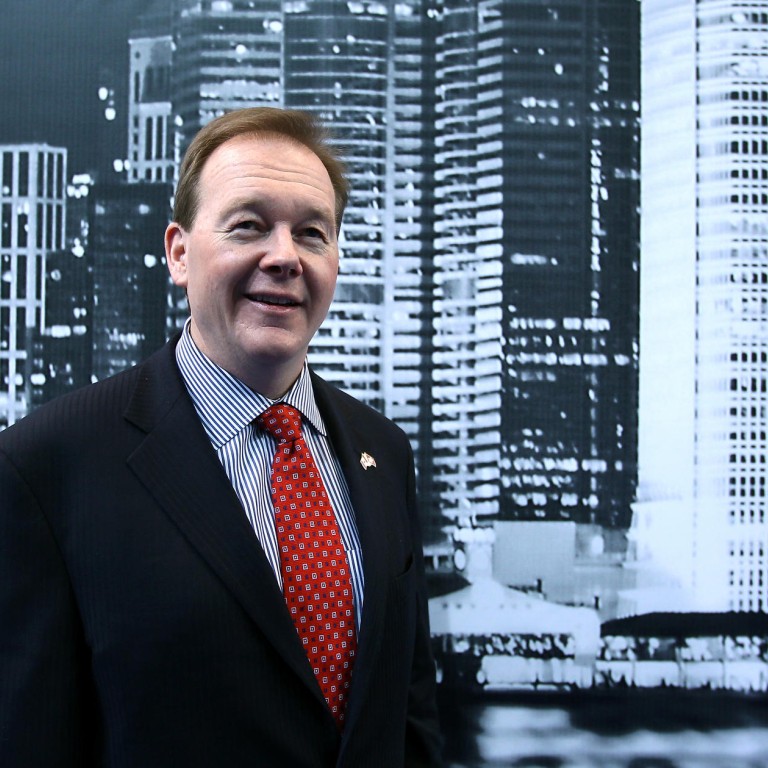
Toronto seeks slice of Hong Kong's turf for listings
TSX chief's bid to boost mining-heavy bourse's profile in the region, in particular for mainland resources firms, adds to pressures on HKEx
The man who runs the Toronto Stock Exchange (TSX), a leading market for mining firms seeking to raise funds, says he wants to attract more mainland and Asian listings. The move is sure to pile more pressure on Hong Kong's bourse, which is reviewing its listing rules in an effort to boost its appeal.

"Asia is going to see rapid economic growth, and the companies in the region can raise funds in [Toronto]. We would also like to see more Asian investors trade in our market."
The Toronto exchange set up an office in Beijing three years ago to promote itself and now lists the stock of 44 mainland firms, mainly mining companies.
Hong Kong Exchanges and Clearing (HKEx), which operates the Hong Kong bourse, is focused on attracting mainland companies but also wants to capture more listings from Asia.
It came under pressure last year to review its listing rules after it lost a potential US$15 billion initial public offering by Alibaba. The mainland e-commerce giant failed to convince Hong Kong regulators to allow it to list with a "partnership structure" that would have given its founder and senior executives, who hold a minority stake, the power to nominate most board members.
Hong Kong regulators stuck to the "one share, one vote" principle, but TSX, like US exchanges, allows dual-share structures. Alibaba mulled listing in New York.
While refusing to comment on the Alibaba case, Cowan said his bourse allowed dual-share structures for some family-owned companies but also emphasised shareholder protection.
"We consider it of utmost importance to have full disclosure so as to allow investors to make a choice," he said.
The 797 mainland companies listed in Hong Kong represent 57 per cent of total market capitalisation, whereas the 44 listed in Toronto represent less than 1 per cent of its market capitalisation.
However, Hong Kong has lost out to TSX when it comes to attracting mining companies, because one of HKEx's rules bans the listing of mining companies in the early stage of exploration.
There are fewer than 100 mining firms listed in Hong Kong, against 1,673 such firms listed in Toronto - 57 per cent of the world's total. In 2012, 70 per cent of the capital raised by mining firms through listings was achieved on the Canadian exchange.
"Mainland China and Asia have a lot of mining companies," Cowan said. "TSX Markets could meet their needs, as we have a lot of mining companies listing, while our investors understand these companies. Our two-tier market structure allows newly set up firms to list, which is popular."
TSX Markets, a subsidiary of TMX Group, runs the Toronto Stock Exchange and a second board, the TSX Venture Exchange. Newly set up companies, including mining firms with no production, can apply to list on the TSX Venture Exchange and then later seek to join the main board.
Hong Kong also has a second board, the Growth Enterprise Market, but companies need to have operated for at least two years before being allowed to raise funds.
Cowan said newly set up companies ran a higher risk of failure, but regulators could check the background of directors and management.
"We would do the due diligence, and we would require the companies to make full disclosure," he said. "We also encourage investors to take a diversified investment approach to diversify their risks."
Christopher Cheung Wah-fung, the legislator who represents the financial services sector, said HKEx needed to upgrade itself.
"The market is getting more globalised, and HKEx needs to provide better services and products to compete," Cheung said. "It makes sense for HKEx to study how to improve the listing rules, but I would oppose any relaxation that would hurt investor protection. There is no way that HKEx would abandon shareholder protection for the sake of getting more listings."
Joseph Tong Tang, executive director of Sun Hung Kai Financial, said Toronto would find it hard to compete with Hong Kong. "HKEx has a long tradition of mainland firms raising funds," he said. "It is true that TSX requirements are lower, but that is exactly the setback. A lower standard means both very good and very bad companies are qualified to list.
"Many listing candidates would prefer to list in a market with higher requirements, as they believe this would give more confidence to their investors."
Stewart Aldcroft, Asia-Pacific chief executive of fund company CitiTrust, said TSX was a niche market.
"It has many investors familiar with mining companies, and that is why it has a dominant role worldwide," he said.
"But the Hong Kong markets offer a wider choice of companies for investors."

